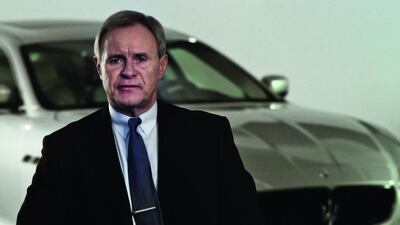The boss of the Italian luxury carmaker has grand future plans
As we media types trudge around the cavernous halls at the world's largest motor shows, most of us are asking ourselves why we do this. But despite the tired, aching limbs and buckled shoulders at the end of a press day, there's one thing most of us are agreed on, and that is that motor shows are ideal venues for sitting down, face to face, with the industry's real movers and shakers.
So it is that I find myself in the inner sanctum of Maserati with a gentle, unassuming man named Harald Wester. You've probably never heard of him, but you'll definitely know the cars that he's ultimately responsible for: he's been Maserati's CEO since August, 2008. His career has been a high-flying one within the Fiat group, and he's still closely involved in the development of Fiat and Alfa Romeo's more bread-and-butter line-ups, offering a wealth of engineering and technical experience.
So, Mr Wester, tell us about the 50,000. Maserati, a company that managed to only sell fewer than 6,300 new cars worldwide last year, has gone on the record to say that it's gunning for annual sales of at least 50,000 within two years. Yes, a lot of other people thought that was hilarious, too. But while Wester admits that it sounds like a ludicrous proposal on the surface, he's defiant in his optimism.
"In the past few months, we unveiled the new Quattroporte at Detroit [motor show], followed later on by the Ghibli at Shanghai," he says unblinkingly. (The US is, he says, still Maserati's biggest market, although more Quattroportes are sold in China now than anywhere else in the world.) "And, as at the end of August, we had collected, globally, 20,300 orders for our cars. So this is a very promising start. We have the orders, and it's proof that what we've been doing in recent years - fixing the quality issues, recreating the brand awareness - it's all working. And the cars are being extremely well-received by our customers, who are looking for a real alternative to what they having been driving over the last decades.
"We won't achieve 50,000 sales a year on just the current range of Maseratis, and the new Levante SUV, which will hit the markets in the second half of 2015, will help us achieve those sales targets. When that car is on sale, in all markets and in all versions it should sell, and I'm being conservative here, 25,000 units a year."
He goes on to say that, at around the same time as the Levante is phased in, the GranTurismo and its various offshoots models will be phased out, to be replaced by an all-new car. He confirms that the Levante will be built in Italy, rather than the US as previously expected, and he talks about restoring part of the Mirafiori Fiat production facility as a state-of-the-art factory that is more robotised and automated, to cope with the huge extra demands of producing more than seven times the current production capacity.
Won't automation adversely affect the perception of customers that Maseratis are hand-, rather than machine-built? "You're right, there is always a trade-off between those two things, but the increases in build quality will make up for that. And, in any case, our cars are still trimmed by hand in the finest luxury materials, so they will still feel and smell the same as they do now. The benefits of automation far outweigh any negative connotations."
Outside, on the display stand, is a new Quattroporte concept designed in conjunction with the Italian gentlemen's clothing company Ermenegildo Zegna. "I think our two companies represent the very best of Italy," he says. "Zegna celebrated its centenary three years ago, we celebrate our next year, so there's a great deal of history, we both deal in style, class and luxury that is not show-off, it's just distinctive. The two brands fit in very well with each other, and we're planning to build 100 cars based on this concept, for all markets, and other projects may well happen as a result."
He says that he has no plans whatsoever to go down the hybrid route, claiming with some force that it's not sustainable technology and that, even if the cars pollute less, they still heavily pollute when it comes to their manufacture. He has a point. More noteworthy, though, is his answer to my final question about whether Maserati should have a halo sports car in its line-up that lives up to the marque's illustrious past.
"You just have to wait a couple of months and you will see what it's going to look like," he winks. The potential is mouth-watering, and Maserati, it would appear, is in perfectly safe hands.

Maserati aims to bring exclusivity to the masses
A chat with Maserati CEO Harald Wester at the Frankfurt Motor Show.
Most popular today
